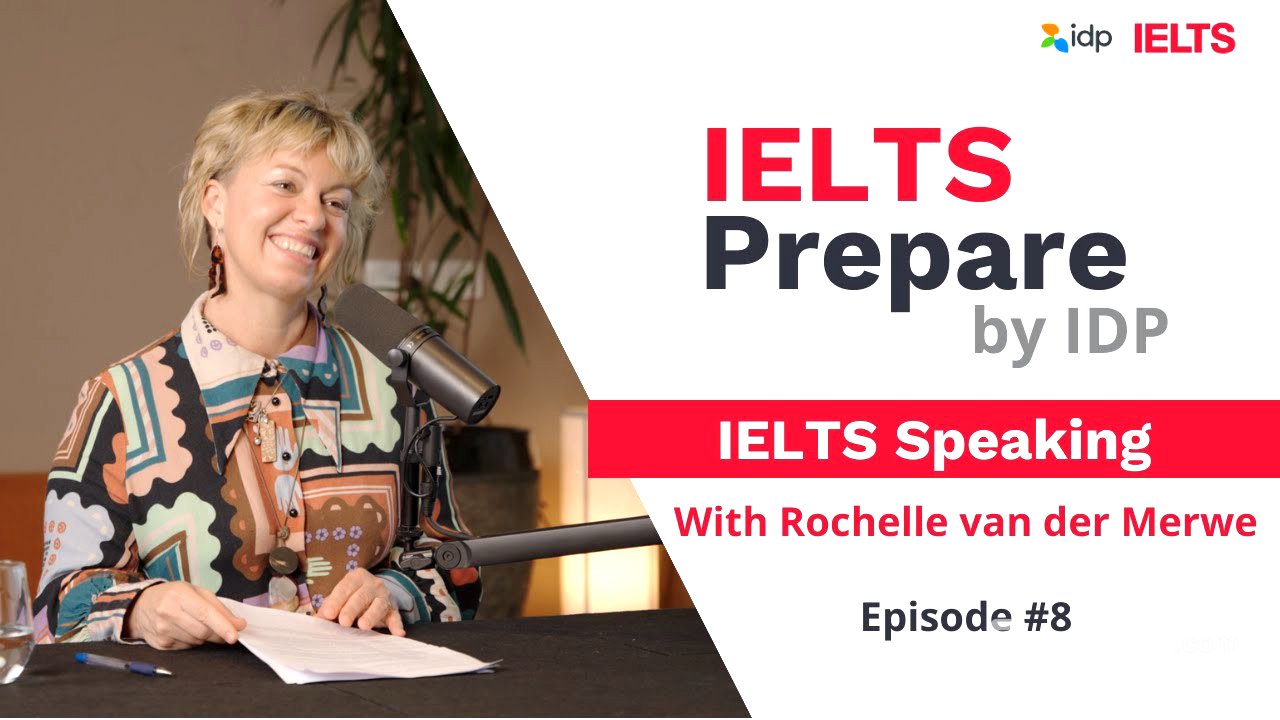TLDR;
This episode of IELTS Prepared by IDP features Rochelle van der Merwe, an IELTS expert, discussing the speaking section of the IELTS test. She clarifies common myths, explains the structure of the test, offers strategies for achieving a high band score, and answers questions from test takers. Key takeaways include understanding the test is about communication skills, focusing on strengths, and practicing speaking regularly.
- The IELTS Speaking test assesses English conversational skills, not just grammar.
- Test takers should focus on conveying ideas fluently and using varied vocabulary.
- Practice speaking regularly and focus on strengths to improve performance.
Myth: I cannot ask the examiner to repeat a question. [1:34]
It is a complete myth that you cannot ask the examiner to repeat a question. The IELTS speaking test assesses conversational English skills, including asking for clarification. Examiners are human and may not always speak clearly, so it's perfectly acceptable to ask them to repeat a question to ensure you understand it correctly.
Topic 1: Question types in the IELTS Speaking test [2:26]
The question types in the IELTS Speaking test are the same for both the General Training and Academic versions. The test is conducted in the same way for both, comprising three parts.
Are the Speaking questions different for IRLTS Academic vs General Training? [2:36]
The speaking questions are the same for both the IELTS Academic and General Training tests. The format and types of questions you'll encounter will not differ based on which version of the test you are taking.
How is the IELTS Speaking test conducted? [2:53]
The IELTS Speaking test is always conducted face-to-face with a real examiner, either in person or via video call. This real-time interaction allows the examiner to guide you if you're nervous and understand various accents, unlike AI-generated tests. The test is divided into three parts.
Is the IELTS Speaking test done face-to-face? [3:37]
The IELTS Speaking test is conducted face-to-face with a real person, an examiner, either in a room or via a screen. This live interaction is a key feature of the IELTS test.
Can you tell us about the three parts of the Speaking test? [4:04]
The speaking test lasts 11-14 minutes. Part 1 (4-5 minutes) involves general questions about yourself. Part 2 (3-4 minutes) includes a one-minute preparation time followed by 1-2 minutes of speaking on a given topic. Part 3 (4-5 minutes) requires discussing general issues from different points of view.
Will the topics in Part 1 be unfamiliar? [4:31]
The topics in Part 1 will not be unfamiliar. The questions are general and designed to be accessible to most people worldwide. If you don't understand something, it's acceptable to explain why, demonstrating your English skills in everyday situations.
Can test takers take notes during part 2 of the IELTS Speaking test? [5:50]
Test takers are encouraged to make notes during the one-minute preparation time in Part 2. Note-taking helps to anchor thoughts and reduce nervousness in a pressured environment.
In Part 2, can test takers speak for just one minute instead of the total 2 minutes allowed? [6:42]
Speaking for only one minute in Part 2 is acceptable, but the examiner will likely encourage you to speak longer. The examiner aims to gather as much language as possible from you to assess your abilities thoroughly.
What can test takers expect for IRLTS Speaking Part 3? [7:28]
In Part 3, test takers should express themselves naturally while discussing general issues from various perspectives. Unlike Parts 1 and 2, which focus on personal experiences, Part 3 requires a broader, more generalised viewpoint. Examiners want to see how you use language to discuss concepts and consider different viewpoints, similar to a dinner party conversation.
In summary, how would you describe the three parts of the IELTS Speaking test? [9:58]
Part 1 and 2 are focused on the test taker's personal experiences, while Part 3 is more general and requires considering different points of view. The duration of each part varies, with Part 1 lasting 4-5 minutes, Part 2 lasting 3-4 minutes (including preparation time), and Part 3 lasting 4-5 minutes, for a total test time of 11-14 minutes.
Topic 2: IELTS Speaking Strategies [10:50]
Strategies for achieving a band 7 or higher in the IELTS Speaking test.
What advice would you give someone who wants to score a band 7 or higher on the IELTS Speaking test? [11:00]
To score a band 7 or higher, don't focus solely on grammar. Convey your ideas effectively using varied language and maintain good fluency. Fluency means speaking at a natural pace, not necessarily quickly.
Is good fluency in speaking related to speaking quickly or slowly? [12:02]
Good fluency does not mean speaking quickly. Speaking too fast can make you unclear. Pacing yourself and using connectives and discourse markers (like "and," "because," "so," "um," and "let me think") can help you maintain a natural flow.
When it comes to vocabulary, should speakers aim to use common or uncommon words to achieve a band 7 or higher? [13:45]
Using uncommon words can help achieve a band 7 or higher. Listen to native speakers in real-time conversations through radio shows, podcasts, and talk shows to pick up new vocabulary. Ensure the speakers are native English speakers. Accents are fine as long as they don't distort the English.
Some people believe that using short and simpler sentences will mean they have greater accuracy. What do you think about this? [16:24]
While using short and simple sentences might improve accuracy, aiming for a band 7 or higher requires using a variety of sentence structures, including complex ones. Examiners can often identify readers by their skilled use of grammar, which comes from reading sentences within context.
What advice would you give test takers preparing for Part 2 of the IELTS Speaking Test? [17:42]
To prepare for Part 2, record yourself speaking about random objects daily. Give yourself a minute to prepare and then speak for a minute. Listen back to the recordings and compare them over time to track your progress.
If you're recording yourself to track your progress, would sharing them with a friend or tutor be helpful? [20:07]
Sharing your recordings with a friend or tutor can be helpful. Consistent practice will make you more comfortable speaking on demand. Remember, no topic is too big or too small; the test assesses your ability to use English to explain your thoughts.
Would it be good for people to practice speaking out loud for Part 1 of the Speaking test? [21:19]
Practising speaking out loud daily is beneficial, even for Part 1, to get used to the sounds of English and speaking on demand. This helps to build confidence and fluency.
Test Taker Questions [21:52]
Answers to common questions from IELTS test takers.
When the examiner takes notes during my test, are they writing down my score? [22:03]
The examiner is not writing down your score when they take notes. They are only noting the time to keep track of the test's duration.
What happens if the examiner interrupts me while I'm speaking? [22:47]
If the examiner interrupts you, it doesn't mean you've lost marks. The examiner interrupts to manage time and ensure you don't speak too much or too little, guiding you through the test.
If I make a mistake, should I correct myself? [23:39]
Correcting mistakes is acceptable occasionally, but frequent corrections can affect your fluency, rhythm, and word grouping, potentially compromising your pronunciation and overall score.
What should I do if I'm given a topic to discuss that I know nothing about? [25:10]
If you receive a topic you know nothing about, you have three options: make up a story (though this can be risky if follow-up questions arise), tell the truth about your lack of experience (but be cautious if the reasons are personal or emotional), or touch on the topic but relate it to something else you're familiar with. The key is to use your English skills to navigate the situation.
Key Takeaways from Rochelle van der Merwe [28:24]
The most important takeaways are: the IELTS Speaking test is not an IQ test but a language test, so communicate what you know or explain why you don't know something; try to be a storyteller and share your thoughts naturally; and focus on your strengths while also working on your weaknesses to let your strengths shine.









